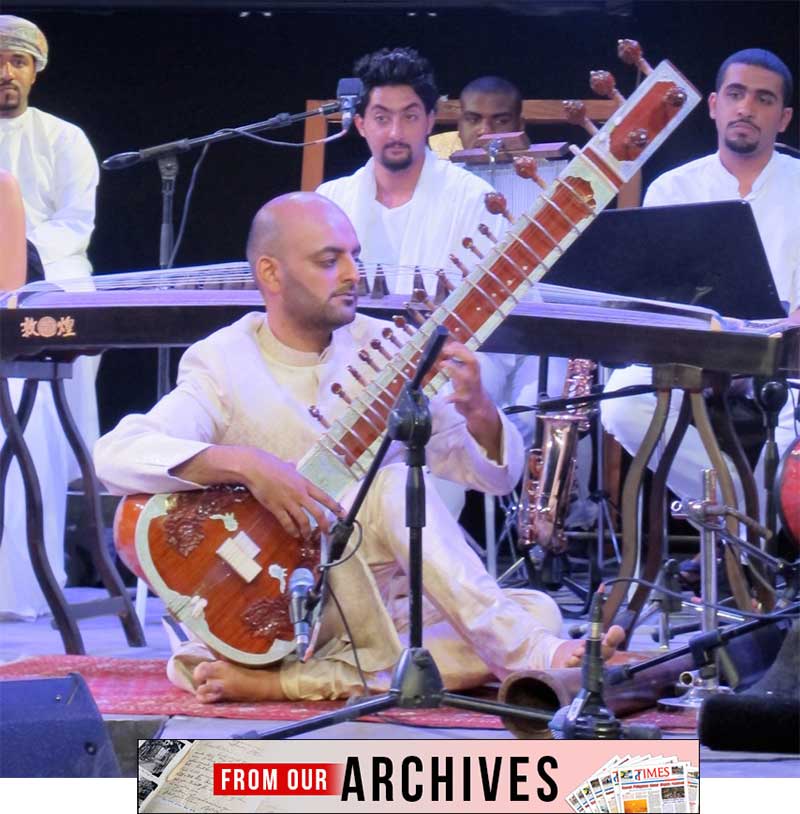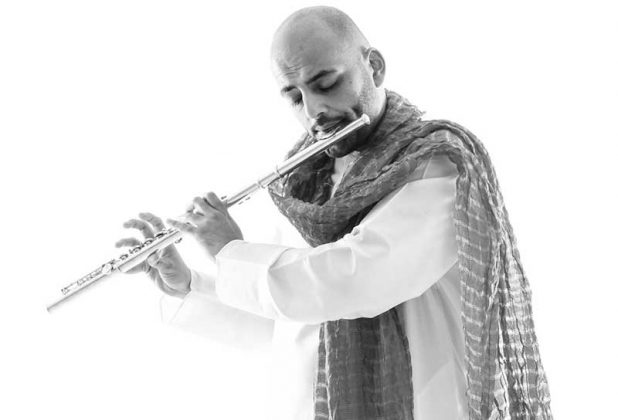Nawaf Gheraibah: Breaking down stereotypes

By Shabana H. Shaikh
Special to The Times Kuwait
This article was first published in The Times Kuwait on April 14, 2013
It’s only appropriate to introduce Nawaf Al Gheraibah with a quote by Leopald Stokowski, a leading orchestral conductor of mid-20th century: “A painter paints his pictures on canvas. But musicians paint their pictures on silence. We provide the music, and you provide the silence.”
When Nawaf and his orchestra of local musicians performed Bija Live at Bayt Lothan last summer, they surprised the audience by playing compositions that made you feel the harmony of music.
Affable to a fault musician/composer/producer, Nawaf could have made his mark anywhere in the world, but he chose home, Kuwait, knowing first hand what he was up against where artistic freedom was concerned. According to him, “If you want your music go international, you need to first break ground at your home-base.”
Winner of ‘Most popular online vote’ for favourite music artist in Kuwait in a poll conducted by www.kuwait-music.com in June 2012, Nawaf is the man responsible for discovering Kuwaiti boy band Army of One and producing their first album – an endeavor that sadly left him disillusioned enough to not only leave Kuwait, but also quit music for five years. “I dropped music during this phase, it was my break point,” he reminisces, however, adding that his self-imposed abstinence ended when he met his lovely wife, Dalal, a creative artist and feminist.
Today, a much calmer Nawaf has the tenacity to work with the system. “I’m not here to make a statement. My life has been about breaking grounds, music is what I love doing and it’s about spreading that joy. That’s art,” he stressed.
Like many progeny of multicultural unions, this half-Kuwaiti, half-Indian/Portuguese, grew up in an environment where he felt ‘confused and alienated’. Yet, embracing his mixed heritage with great humility, he de facto, used it to his advantage. Nawaf post-graduated from the University of Southampton and currently, is an instructor at the Higher Institute of Musical Arts, Kuwait, motivating a new generation of musician.
Besides exploring independent and traditional music, Nawaf also possesses an innate talent for playing various instruments. Nawaf introduced some of the exotic instruments he has self-taught – such as the Guzheng, a Chinese instrument; the Zen Tambour, which is a round steel-tongue drum originally modeled from a propane tank and played with fingers or mallets; and the Didgeridoo, a long wind instrument that dates back nearly 1,500 years and was developed by Indigenous Australians.
Without further ado, Nawaf talks to The Times about his music, laments the decline of art-culture and shares a bit about his upcoming concert later this year.
TTK: When did you realize that music was your calling in life?
NG: I was a classical piano player back in High school, but being a Kuwaiti, I was expect to study anything other than music. I was supposed to be a doctor or an engineer. I ended up doing computer science, reached my diploma year, and then my heart started pounding for music. I returned to the music field and haven’t looked back since.
TTK: There’s an interesting childhood story about the piano and you. Do share.
NG: As a kid, I didn’t have a piano at home. I used to sneak into my High school through a window, which was so high, that once inside, I would remain stuck until the next day! So, I would play to my heart’s content and the next morning, pull on my uniform and rush to class, sleeping through my first period.
TTK: While pursuing academics, you didn’t lose sight of music. Where you musically influenced by either of your parents?
NG: Even though it is my mother who comes from a music loving community, it’s actually my father, who is an excellent guitarist. I grew up watching him play for his friends and I was in awe of him. He’s my role model. But though he supported me, he didn’t direct me towards playing it. When he noticed I had a genuine interest, and I was sneaking into school to play, he bought me a piano.
TTK: Admirably, you have learned to play most instruments by yourself. Which ones you currently play?
NG: I primarily played the piano, which is my soul, and the guitar. Then through traveling, I learned to play the Tabla, the Indian Sitar, the Arabian Oud, the Indian flute, and the Aboriginal Didgeridoo, to name a few.
TTK: Post-1990 Kuwait has not been conducive to stage-culture. So, was it easy to organize a show like Bija Live?
NG: Kuwait used to be an active cultural center back in the 70’s and 80’s. Today, it’s all so hard, but hopefully, it’s reviving. When Bayt Lothan agreed to have my show, nobody had a clue what to expect. Bayt Lothan did not know what I was going to performance. 70% of my musicians were my students, while the other 30% were first-timers on stage. It was a relief when nothing went wrong!
TTK: If you had to, how would you define your music and audience?
NG: My music is synthesis. I infuse a variety of spiritual elements from Far East and Indian culture, folk from Swhali, African, Arabian Sea songs, etc. into my compositions. My music is not about being popular, but rather about loving what you play. It’s not for money or to be on Billboards. So naturally, some may like my kind of music, while others may not. As for my audience, I don’t believe in categorizing. I’d be thrilled if I could reach the masses. I wish to see folks from every walk of life, sitting at my concerts, instead of selective and distinguished few.
TTK: Tell us about your upcoming concert in November, this year.
NG: You will have to excuse me, as I cannot disclose much, except, that it’s going to be big – about 2,000 seater crowd – and first of it’s kind to be held in Kuwait. My musicians and singers are currently prepping for it and we have acquired nearly 90% of official approvals. You’ll have to just wait a bit more.
TTK: Coming to my final question, like all good success stories, there is a woman behind yours, too, right?
NG: Absolutely. I owe my comeback to my wife, Dalal. When I met her, she enthused something in me, encouraged me to go back to music. I remember telling her how much I wanted to play a flute, but I was told I couldn’t play it because I had a crooked chin. Dalal made me buy one and now, I not only play the flute well, but also carve them.
Official website:
www.gheraibah.com















